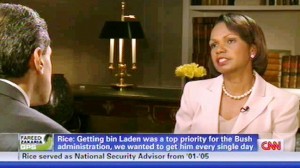I admit I'm a bit more obsessed with the word friend than the average person. I seem to see and hear it everywhere. The same way you begin to notice everyone else has your car once you buy it, how many pregnant women there are when you find out your pregnant, etc. My antennae is attuned. Reading through my Oprah magazine the other night... I seemed to circle the word on every page from some health study, research update, celebrity interview or feature story. I'm probably the only one who does such a thing. I own the fact that I'm a wee-bit more sensitive to its usage. So while I am rarely shocked at my aptitude to hear that word more frequently than others, even I was surprised when I heard it on a serious political Sunday morning news program last weekend.
The Limitations of the Word Friend in World Politics
Condoleezza Rice (former Secretary of State in the George W. Bush administration) at the end of an interview with Fareed Zakaria, (host of CNN's GPS Sunday morning news show) used the ubiquitous word, friend, in what I'd call an inappropriate place.
Fareed, at the end of the interview asked Rice to respond to the repeated criticisms pointed at her by her former cabinet member, Don Rumsfeld, Bush's Secretary of Defense.
Fareed: "Rumsfeld says you were, to put it bluntly, a bad national security adviser.. that produced a lot of the dysfunction... putting the blame squarely on you."
Rice: "Don is a friend and will always be a friend. But he's a grumpy guy, he really is, and simply doesn't know what he's talking about."
Ummm... er... Friend? Really? Someone who a) isn't close enough to you to know what he's talking about, b) criticizes you publicly in his book and interviews, c) implies in not-so-subtle terms that you're incompetent or unqualified, d) throws you under the bus in front of one of the least popular presidents and all the issues surrounding him, and e) as if that's not enough, he's what you'd call a big grump... this is your friend, the one who will "always" be your friend?
The Limitations of the Word Friend in our English Language
For all the women who go through my 21-Day Friendship Journey, the one thing they thank me for, more than anything else, is helping break down the definition of friendship and clearly seeing the different types of friends that we all need. I've found that we frequently make the mistake of defining the word too narrowly: feeling like everyone has to be a BFF or nothing. That couldn't be further from the truth.
But even I must say that I have no category for the friendship that Rice is describing. The Rumsfeld-Rice friendship, to me, is simply not friendship. But it does reveal that we lack enough words that carry the nuances we're trying to describe.
I think that what she was trying to say is that this was someone she knows well, in that they do have a rare bond due to some commonalities and shared experiences. And certainly there is some platonic intimacy there-- where they know a lot of private things about each other.
But does going through a common experience in a bonding way make someone a friend? It can, yes. But it doesn't automatically mean that anyone you're close to is a friend.
I don't care how close you have felt to someone, or how bonding the experience was that you went through-- friendship is not defined by the external circumstances that pushed you together, as much as it is by how you responded to each other in those moments.
If someone proves over-and-over to not have your back, to not want your success, to point fingers, and to be a bear to be around-- this is not a mutual, healthy and positive relationship. Therefore, it is not a friendship.
The problem is... I don't know what it is. Do you? What word could she have used instead?
- Colleague is too flat, missing the intensity.
- Enemy is too strong, communicating some hate or fear that may not be there.
- Acquaintance or Contact doesn't speak to the intimacy or bond.
What other words do we have? What words are outside the word friend and yet still communicate the shared relationship? Do we need to make one up? Any ideas?
I'm not going to get over-anal on policing the use of the word friend. I'm okay over-using it to describe all kinds of relationships, but can't we semi-protect it to at least be limited to people who attempt friendliness?
Okay, off my soapbox. :)
___________________________
Side-notes:
- If interested in the next cycle of the 21 Days of Friendship process, use the code Blog to save $10.
- I only blog here about once a week, but you can sign up separately to receive notifications of when I post a new article on Huffington Post like my most recent "To the Lonely Married Women."


